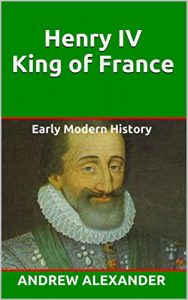Henry IV (also known as Henry of Bourbon or Henry of Navarre) is considered to be one of France’s greatest kings.
He was the founder of the Bourbon dynasty of French monarchs. Baptised a Catholic, raised as a Protestant, Henry fought alongside the Huguenot forces during the French Wars of Religion.
Described as, "the most French of French kings,” Henry was a politique; he did not allow his principles, religious or political to stand in the way of actions that he saw as expedient.
He enjoyed the outdoor life. He was high-spirited and good humoured. A great lover of women; he was reputed to have had at least fifty-six mistresses, acquiring the sobriquet, "le vert gallant," - the gay spark.
To many Frenchmen of his day, he was the king who restored French national unity and halted the attempt by Spain to make France a dependency.
This 4,900-word summary provides the reader with an understanding of Henry and his reign, both as a study in its own right and as a stepping-stone to further research.
The main areas covered in this work are:
• Henry’s Character
• Henry’s First Marriage
• The Saint Bartholomew’s Day Massacre
• The Wars of Religion
• The Treaty of Vervins
• The Edict of Nantes
• Henry’s Second Marriage
• The Domestic Policies of Henry IV
• The Financial Polices of Sully
• Henry’s Court
• Henry and the French Catholic Church
• Henry and the French Nobility
• The Foreign Policy of Henry IV
• The Spanish Road
• The Cleves-Julich Affair
• The Grand Design
• Henry's Death
• An Assessment of the Successes and Failures of Henry IV as king of France.
Early Modern Age Series by Andrew Alexander:
Europe in 1500.
Ferdinand of Aragon and Isabella of Castile.
Charles V – Holy Roman Emperor.
The Protestant Reformation.
Philip II – King of Spain.
Henry IV – King of France.
Cardinal Mazarin – Chief Minister of France.
Cardinal Richelieu’s Foreign Policy.
Louis XIV – King of France.
The Decline of Spain in the Seventeenth Century.
Peter the Great – Tsar of Russia.
He was the founder of the Bourbon dynasty of French monarchs. Baptised a Catholic, raised as a Protestant, Henry fought alongside the Huguenot forces during the French Wars of Religion.
Described as, "the most French of French kings,” Henry was a politique; he did not allow his principles, religious or political to stand in the way of actions that he saw as expedient.
He enjoyed the outdoor life. He was high-spirited and good humoured. A great lover of women; he was reputed to have had at least fifty-six mistresses, acquiring the sobriquet, "le vert gallant," - the gay spark.
To many Frenchmen of his day, he was the king who restored French national unity and halted the attempt by Spain to make France a dependency.
This 4,900-word summary provides the reader with an understanding of Henry and his reign, both as a study in its own right and as a stepping-stone to further research.
The main areas covered in this work are:
• Henry’s Character
• Henry’s First Marriage
• The Saint Bartholomew’s Day Massacre
• The Wars of Religion
• The Treaty of Vervins
• The Edict of Nantes
• Henry’s Second Marriage
• The Domestic Policies of Henry IV
• The Financial Polices of Sully
• Henry’s Court
• Henry and the French Catholic Church
• Henry and the French Nobility
• The Foreign Policy of Henry IV
• The Spanish Road
• The Cleves-Julich Affair
• The Grand Design
• Henry's Death
• An Assessment of the Successes and Failures of Henry IV as king of France.
Early Modern Age Series by Andrew Alexander:
Europe in 1500.
Ferdinand of Aragon and Isabella of Castile.
Charles V – Holy Roman Emperor.
The Protestant Reformation.
Philip II – King of Spain.
Henry IV – King of France.
Cardinal Mazarin – Chief Minister of France.
Cardinal Richelieu’s Foreign Policy.
Louis XIV – King of France.
The Decline of Spain in the Seventeenth Century.
Peter the Great – Tsar of Russia.






